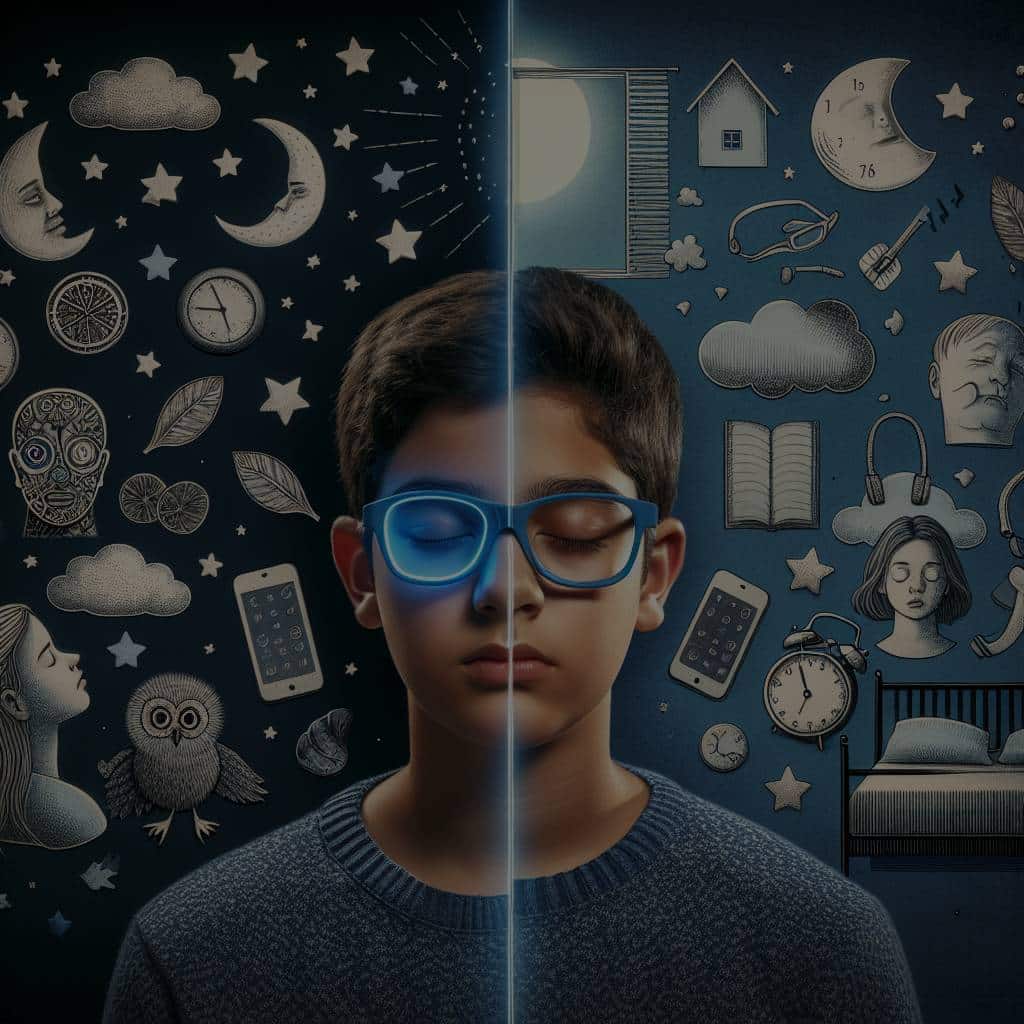How Does the Use of Blue Light Filtering Glasses Impact Sleep Quality in Adolescents?

Light has a profound impact on our sleep, and it’s not just about whether you leave the bedside lamp on. With the advent of screens on our phones, laptops, and tablets, we’re exposed to far more blue light than our ancestors. But what impact does this have on our sleep – particularly on adolescents, who seem glued to screens at all hours of the day and night? A growing body of research suggests that the use of blue light filtering glasses could improve sleep quality. Here, we delve into what exactly blue light is, how it affects sleep, and what the studies say about the benefits of blue light filtering glasses.
Understanding Blue Light and Its Effects on Sleep
Before we can understand how blue light affects sleep, it’s helpful to know a little about our bodies’ circadian rhythms. These are the natural, internal processes that regulate our sleep-wake cycle. They repeat roughly every 24 hours and respond primarily to light and darkness in our environment.
Also to discover : Experience quality living at rosewood care home dartford
Blue light is a particular wavelength of light that is most commonly associated with the screens of electronic devices. It’s been linked to difficulties in falling asleep, reduced sleep quality, and daytime fatigue. This is because exposure to blue light suppresses the production of melatonin, a hormone that signals to our bodies that it’s time for sleep.
When we’re exposed to blue light – particularly in the hours leading up to bedtime – it can confuse our circadian rhythms and make it harder to fall asleep. This is especially true for adolescents, who are often up late studying or socializing on their devices.
Also read : How to Optimize Vitamin D Absorption for Bone Health in Cloudy Climates?
The Science of Blue Light Filtering Glasses
Now that we understand the problem, let’s explore a potential solution: blue light filtering glasses. These glasses have specially-designed lenses that filter out the blue light emitted by screens. They’ve been gaining popularity as a tool to help people sleep better, but what does the science say?
A number of studies have shown promising results. One randomized controlled trial (RCT) found that adolescents who wore blue light filtering glasses in the hours before bedtime had improved sleep quality and felt more alert in the morning. Another study found that these glasses can increase melatonin levels, thereby enhancing sleep.
However, it’s not just about improving sleep. Blue light filtering glasses have also shown potential benefits in terms of cognitive performance. One study found that wearing the glasses improved decision-making abilities and reaction times in adolescents, suggesting that the benefits extend beyond the bedroom.
Beyond Glasses: Other Interventions for Blue Light Exposure
While blue light filtering glasses provide an effective intervention for blue light exposure, they’re not the only solution. There are other ways to manage blue light and its effects on sleep.
Firstly, limiting screen time in the hours leading up to bedtime can be beneficial. This gives the brain time to wind down and start producing melatonin. In particular, avoiding screens for at least one hour before bed is recommended.
Another option is to use the "night mode" setting available on many digital devices. This adjusts the color temperature of the screen to reduce blue light emissions. While it’s not as effective as blue light filtering glasses, it can still make a difference.
Of course, these interventions are most effective when combined with good sleep hygiene. This includes maintaining a consistent sleep schedule, ensuring your bedroom is dark and quiet, and avoiding caffeine and heavy meals in the hours before bedtime.
Blue Light Filtering Glasses: Convenience vs Concerns
The growing body of research supporting the benefits of blue light filtering glasses is impressive, but it’s important to remember that they’re not a magic bullet. They provide a convenient solution to the problem of blue light exposure, but they’re not a replacement for good sleep hygiene.
Moreover, while these glasses can filter out most blue light, they can’t block it entirely. Some light will still reach your eyes, so it’s important to combine their use with other interventions, like limiting screen time.
Lastly, it’s worth noting that while the current studies show promising results, more research is needed to fully understand the long-term effects of wearing blue light filtering glasses. As with any new intervention, it’s wise to approach with caution and consult a healthcare professional before making any significant changes to your sleep habits.
The Correlation between Blue Light Exposure and Cognitive Performance
Understanding the relationship between blue light exposure and cognitive performance is crucial in appreciating the potential benefits of using blue light filtering glasses. It’s well-documented that sleep quality and duration can have a significant impact on cognitive performance. The effects of poor sleep can be profound, leading to decreased attention spans, impaired memory, and reduced problem-solving skills.
In this light, a study published in Google Scholar investigated the link between blue light exposure, sleep, and cognitive performance in adolescents. The research revealed that blue light, particularly at night, could lead to sleep disturbances, which in turn can affect cognitive performance. With disrupted sleep, the brain’s ability to function optimally was compromised, leading to decreased cognitive performance.
However, the study also found that the use of blue light filtering glasses could mitigate these effects. The glasses, also known as amber lenses, were found to improve sleep duration and quality. Consequently, the adolescents who wore the glasses showed enhanced cognitive performance, including improved reaction times, attention spans, and problem-solving skills.
Long-term Impact and Concerns of Blue Light Blocking Glasses
While the benefits of blue light blocking glasses are promising, it’s important to consider potential long-term effects. As this is a relatively new area of research, we still have a lot to learn about the long-term implications of wearing blue light blocking glasses.
To date, much of the research, including studies linked on NCBI NLM, has been short-term, focusing on immediate effects on sleep quality and cognitive performance. However, as with any intervention, potential long-term effects must be considered.
For instance, some concerns have been raised about the possibility of reduced visual acuity or potential eye strain from prolonged use of these glasses. While most studies, including those on NCBI NLM, have found no significant adverse effects, more comprehensive, long-term studies are needed.
It’s also important to consider the psychological impact of relying on a device to ensure quality sleep. Some experts express concerns about the risk of dependence, arguing that it might undermine the importance of natural sleep hygiene practices.
Conclusion
In conclusion, blue light filtering glasses, or amber lenses, provide a convenient method to counter the effects of blue light exposure from electronic devices. The research, including studies found on Google Scholar and NCBI NLM, suggests that these glasses can help improve sleep quality and enhance cognitive performance, particularly in adolescents.
However, it’s vital to remember that these glasses are not a panacea. They should be used as part of a holistic approach to good sleep hygiene, which includes limiting screen time, particularly at night, and adhering to a consistent sleep schedule.
While the initial research is promising, more extensive, long-term studies are needed to provide a definitive understanding of the benefits and potential drawbacks of using blue light blocking glasses. As with all health interventions, it’s advisable to consult a healthcare professional before making significant changes to your sleep routines.
